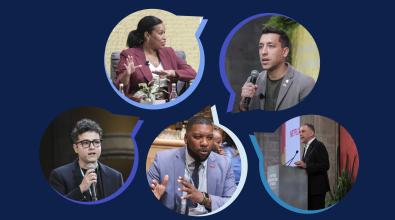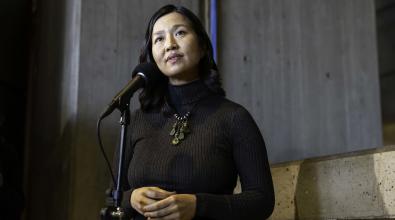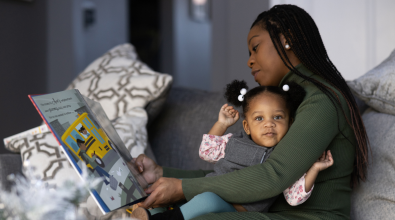Photo essay: When residents are co-creators, ideas get better
You’ve heard this before: City Hall’s best ideas are designed with residents, not for them. But what does that really mean? The 50 cities who are finalists in this year’s Global Mayors Challenge can tell you. Residents, business owners, and other stakeholders helped to generate many of the breakthrough ideas these cities entered into the competition for a chance to win $1 million. And the feedback residents are giving as city leaders test, iterate, and develop these programs, policies, and services, is making the ideas even stronger. Here, our team of Bloomberg Cities photographers shows us what co-creation looks like, and introduces us to the people on the ground who are making it happen.
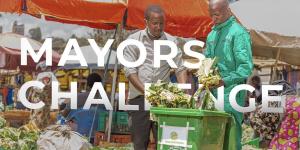
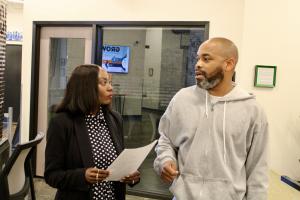
Photo: Isabelle Stewart
Akron, U.S.
Entrepreneur Shasta Sadler (right) consults with LaQuata Williams, his mentor through Akron’s THRIVE program. Through this Mayors Challenge idea, the city aims to spark new Black-owned businesses by pairing aspiring business owners with mentors who can connect them with financial support and resources. The relationship has already helped Sadler, who has worked in construction for 20 years, make progress on a number of goals. “I’ve learned there are a lot of things I did not know about getting a business off the ground,” he says. “Since I’ve joined the program, I have been able to secure a lot of essential things.”
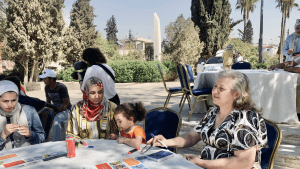
Photo: Farah AlQawasmeh
Amman, Jordan
Bassima Zafir (right) provides feedback on the connectivity maps that the city of Amman is developing to identify which neighborhoods are experiencing gaps in critical services—and to improve emergency response throughout the city. After she lost her job managing a guest house during the pandemic, Zafir worked as a volunteer delivering food and essential items to residents who, in many cases, couldn’t access food or services because of where they lived in the city. The best thing about the city’s Mayors Challenge effort, she says, is “the way its idea speaks to people” and how it demonstrates that “the Greater Amman Municipality team wants to listen to our problems."
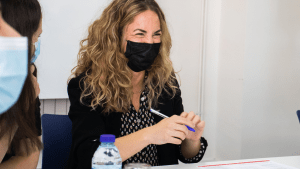
Photo: Josu Sanchez Reyna
Bilbao, Spain
Iraia Monteagudo Sancho, the director of the technical office of INNOLAB Bilbao, joins a group of local CEOs and leaders to offer feedback on the cybersecurity of Bilbao’s public internet service. Bilbao provides free WiFi to residents, but the pandemic lockdown highlighted risks that make the network vulnerable. Through the Mayors Challenge, the city is working to make the network more secure—starting by educating residents about malicious software and cyberattacks. "It’s very important that there’s training and awareness to show, on the one hand, the risks that exist, and on the other hand, what we can do to prevent them or to solve them,” Sancho says. “We need real solutions to make a real impact.”

Photo: Robert Crawford
Birmingham, USA
The only way Darlena King (right) can get to the grocery store is to walk a mile to the bus stop and then wait for a bus that sometimes never comes. Today, as she waited with graduate apprentices from the Jones Valley Teaching Farm, the bus didn’t arrive. King isn’t alone. Nearly 70 percent of Birmingham residents have inadequate access to food. “It’s so taxing on some of our neighbors just to get fresh food,” she says. That’s why the city of Birmingham has partnered with the Jones Valley Teaching Farm to create the Birmingham Food Corps, a group of recent graduates who will help expand urban farms and test other innovative ways to increase access to fresh food. Here, the graduate apprentices joined King on her journey so they could better understand the challenges she faces.
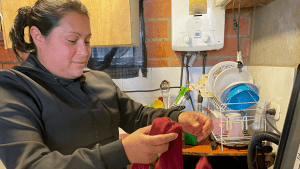
Photo: Sebastián Orjuela
Bogota, Colombia
“I didn’t have any place to go to school before,” says Sandra Johanna Daza. “I had to take the bus, which didn’t allow me to either work or take care of my kids.” Daza, who works in recycling, is one of the 1.2 million women in Bogotá who devote an average of five and a half hours per day to unpaid housework or care responsibilities. But now she’s completing her high school degree through the Care Block, a city program offering educational opportunities for low-income women caregivers. Daza plans to go beyond high school. “I want to study nursing, so that my children can do the same,” she says.

Photo: Gerald Rago
Butuan, Philippines
“AgriBoost is a blessing from God,” says farmer Lydia Aparri, of Butuan’s Mayors Challenge program. AgriBoost aims to fine-tune an ineffective agriculture market by providing farmers predictive data to make better decisions about the types and amounts of crops to grow, fix commodity pricing to reduce risks on vegetables and high-demand foods, and create an app that connects farmers directly with grocery stores and restaurants that want to purchase their goods. Aparri participated in testing the program, and she appreciated being only “a click away” from the community. “Perhaps, this is the time where farmers’ lives will be improved,” she says, adding that, by selecting Butuan as a finalist, Bloomberg Philanthropies was recognizing not only the city—but also the farmers themselves.
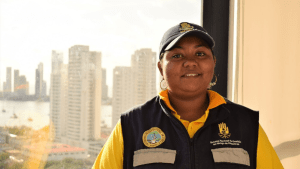
Photo: Eulalia Castro
Cartagena, Colombia
Omaira Reyes has always helped others. As a volunteer on her Neighborhood Emergency Committee for more than 10 years, she raised awareness in her community about risk prevention. Now the city has designated Reyes and community members like her to act as first responders in a plan to improve Cartagena’s emergency response systems. Reyes, who herself has had to evacuate her home during severe flooding, joined the city in distributing and testing an emergency bracelet that will help locate people in trouble when other communication systems go down. She was surprised to learn about the new technology and that something so simple could potentially be a game-changer. “The city of Cartagena will have fewer victims of emergencies and more capacity to help more people” as a result of this Mayors Challenge effort, Reyes says
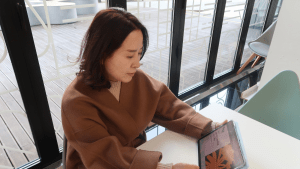
Photo: Choi Se-Eun
Daegu, South Korea
Daegu resident Lee Mi-kyung tests the city’s new platform to allow residents to easily book public spaces for all types of social and cultural activities. The city hopes the easy-to-use system will help empower people like Lee to shape and enrich public life. Daegu was fighting high rates of out-migration even before the pandemic upended public life. “It felt as if the city came to a stop during the pandemic,” Lee says. The lockdown led Lee to try new hobbies like dance and vocal lessons. “It made me think that such activities can enrich citizens’ lives,” she says. “In the end, in order for the city to be happy, citizens must be able to find happiness of their own.”

Photo: Joe Habben
Glasgow, U.K.
Gillian Leslie (center) joins her children Kira (left) and Andrew outside a Neighborhood Design Jam she helped plan with the Glasgow City Council. Concerned about the lack of facilities for young people in her neighborhood, Leslie approached the city with an idea to revive the local Corkerhill skatepark, which has fallen into disrepair. Gillian collaborated with the Council’s Centre for Civic Innovation to host a Design Jam that invited young people from her area to re-imagine this skatepark. It was part of the city’s larger Mayors Challenge effort to engage residents in designing new solutions for the city. “It was incredible to witness the passion and enthusiasm that the young people had,” Leslie says. “If we give children a voice to enable them to create an environment they love, respect and care for, together, are we not building creative, successful, respectful citizens for the future?”

Photo: Clarissa Bell
Hermosillo, Mexico
Ana Belén Garcia Felician was one of many women in Hermosillo who lost her job during the COVID-19 pandemic. In fact, the city estimates that twice as many women as men became unemployed during the pandemic. But now she’s getting back into the workforce as part of the city’s Biciclando program. The program will boost recycling in the city by equipping women with bicycles and trailers to collect recyclables. Garcia says she’s happy to be employed in a program that supports the greater good. “For me, it is a very beautiful experience because, apart from just helping clean the city, I help my daughter become aware of the issue and leave her with the wisdom not to improperly dispose of garbage and to help collect it for the benefit of everyone.”

Photo: Oğulcan Delipınar
Istanbul, Turkey
Aydan Arat, a retired teacher from Istanbul, anonymously donated to a resident in need through the city’s innovative Askida Fatura campaign. The “pay-it-forward” program grew out of the informal philanthropy that developed during the pandemic—and is now being strengthened as part of the city’s Mayors Challenge effort. Arat says the program, which allowed to select whether she wanted to help neighbors cover their water, childcare, or education bills, helped her feel more connected during times of isolation. “The Askida Fatura campaign has revealed the spirit of cooperation and solidarity in people,” she says. “It has brought together those who try hard to keep food on the table, who are not working, or who are unemployed, and those who are in a good financial condition—and they have not even seen each other.”
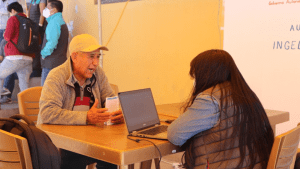
Photo: Rodrigo Herrera
La Paz, Bolivia
Ernesto Gonzales Lara (left), President of the Cotahuma Neighborhood Council, speaks with La Paz Mayors Challenge team members about issues with infrastructure and crowding in his neighborhood. “We have two-story homes that are only registered as one-story,” he says. In La Paz, 80 percent of the population lives in just 20 percent of the city—and infrastructure suffers, as a result. The Mayors Challenge team interviewed residents like Gonzales to inform the city’s effort to develop nine new urban centers to re-distribute growth across the city and ease the pressure on the city center.

Photo: Taris Smith
Louisville, U.S.
Ta’Mia Malone (left) and Alex Bouitt are just two of the high school students who have taken part in Louisville’s Butterfly Project, which aims to teach data and technology skills to young people of color in order to both prepare them for high-paying career opportunities and empower them to use these skills to drive toward social change and racial justice. Bouitt says she is deeply connected to the project due to her mother’s daily difficulties with transportation and finding employment. The data she studied connected transportation to unemployment for certain demographics in Louisville. “Addressing the issues will not only make it better for the groups of people affected but also raise awareness to the community to take more preventative actions,” Bouitt says.

Photo: Sana Ginwalla
Lusaka, Zambia
Eunice Mulenga receives a new plastic bin to recycle her organic waste as part of the city’s new Waste2Cash program. Lusaka lacks a comprehensive waste management system, which has led to poor hygiene and illnesses. The Waste2Cash program encourages residents like Mulenga to take part in sustainable waste management by recycling organic waste into valuable products like biogas and fertilizer. Before getting the bin, Mulenga attended a workshop where she learned, “how to handle waste and how to separate waste in our homes,” she says. “We were even advised to have three or more waste plastics and sacks for separation.” Mulenga believes the program offers her an opportunity not just to clean up the city but also to improve livelihoods.
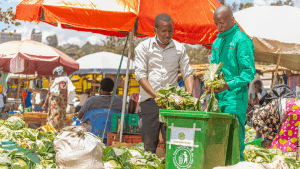
Photo: Gathukia Mwangi
Meru, Kenya
Muthamiri Moses is a member of the Meru Youth service, an empowerment initiative whose objective is to alleviate youth unemployment hopelessness and poverty.Muthamiri has been an integral part of the BSF pilot, helping in waste segregation and recycling in the market as part of the Meru team's circular economy goals and long-term strategic plans to improve organic waste management. He joined the team at the start of the resident engagement initiative. He has been responsible for collecting the waste from the market, managing the greenhouse, feeding the worms, and taking records. According to Muthamiri, the BSF project provided him with an opportunity to learn a valuable new skill that he feels with some support would provide for him a continuous revenue stream. He also points out that BSF farming can provide new job opportunities for youth and women. He believes on implementation, the BSF organic waste processing facilities will create employment, both formal and informal, helping create jobs for the country residents, especially the youth.

Photo: Hwa Pung Yoo
Paris, France
An activist in the youth-led climate movement in Paris, Martial Breton is one of the young people participating in the Paris Climate Academy, which trains and certifies people aged 9-to-25 to take action on climate change. “The government could have put all of their resources [into] just having youth come, trying to teach them classes, and go,” Martial says. “Instead, all of the stakeholders—the partners, the city, the youth NGOs—bring their perspectives and visions to make the Academy.” Breton has contributed his vision to everything from designing the Academy’s own “COP26” conference to reorganizing the building layout. The Academy is designed so that officials can make decisions with young people, not for them. “There is a huge difference between when youth are consulted and when youth are part of the decision,” Breton says. “And here you are part of the decision.”
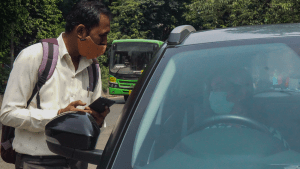
Photo: Abhishek Gijare
Pune, India
Amit Magar, left, interviews an electric car owner as she heads out of a market. Magar has been supporting the city by interviewing residents of Pune to understand their receptivity to electric vehicles as the city uses the Mayors Challenge process to develop its EV-readiness plan to promote early adoption of EVs. He has spoken to cab drivers, auto rickshaw drivers, bus passengers, students, private vehicle owners and even current EV owners. Magar says he shares the concerns of many residents about access to charging stations and whether charging plugs will have a universal design. But he believes that switching to electric vehicles will benefit his city by reducing pollution and providing financial relief to families amidst rising fuel prices.

Photo: Joaquim Lima
Rio de Janeiro, Brazil
Wallance Junior, 26, lives in Jacarezinho, a favela in Rio de Janeiro. He lost the use of his legs after being shot in a gunfight, and relies on his parents and neighbors for support. The building where he lives is prone to leaks, moisture and mold with only one small vent for air circulation, and the poor housing conditions led to Junior contracting tuberculosis. Through the Mayors Challenge, the city of Rio de Janeiro has launched a project to improve housing conditions for Junior and thousands others living in similar circumstances. The city is using laser-scanning technology to create 4-D digital maps of the favelas, so policymakers can better understand housing conditions and structural problems and make decisions that improve the lives of thousands.
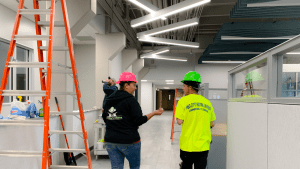
Photo: Anuja KC
Rochester, USA
Darcy Tello, left, owner of Med City Installation, and her employee, Trevor Hatton-York, visit a work site. Tello opened her commercial flooring business two years ago and now has six employees. Now, she’s part of a team of Rochester residents co-designing a city program through the Mayors Challenge to create pathways for BIPOC women to enter the fast-growing construction industry. “We need to knock down these barriers and provide different opportunities to women, especially BIPOC women, in the construction industry,” Tello says. “Once we take off these blinders, the growth will come for this city and community.” Tello is sharing her first-hand knowledge as a BIPOC woman in business and her struggles and achievements as a new business owner. “Change is hard but if the whole community comes together to make this initiative a success, we will be looking at a better and different future,” she says.

Photo: Mauricio Manzano
Rosario, Argentina
Franco Juárez stands with the cart he uses to collect recyclable waste throughout the city. Most waste in Rosario is collected by informal waste collectors, traditionally a low-paying job with dangerous working conditions. Through the Mayors Challenge, the city set out to formalize the job, improve working conditions and increase pay. Juárez, who lost his job during the COVID-19 pandemic, began collecting waste to support his partner and five-year-old son. Every day he goes to work recovering recyclable materials and at the end of the day, he takes his loaded car to the Recovery Center and sells the fruit of his work. The city ensures a fair price. “This project gave me back my motivation,” he says. “Many people who are in the same situation as mine can have a decent and formal job. Not only that, but it also improves the hygiene of the entire city of Rosario.”
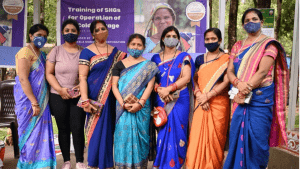
Photo: Soumya Sucharita Dash
Rourkela, India
Minati Mallick, far right, the leader of Maa Tarini Self-Help Group, stands with female members of Rourkela’s Mayors Challenge team at a vendor registration counter at VSS Market. Rourkela is testing a project to provide refrigeration for women street traders, whose produce often must be thrown out at the end of the day. But the program isn’t just reducing food waste, it’s also creating employment for women from Mallick’s Self-Help Group. They have been hired to manage the cold rooms, weighing and checking in produce in the evening and returning it to the vendors in the morning. “We can support our families now,” Mallick says. “Our lives would be completely changed if this project clicks. It’s not just us but all the residents of our city would be able to reap its benefits.”

Photo: Jin Huang
Taipei, Taiwan
Shih Yu-Mei (石玉美), 72, a retired teacher, props her phone on the table so she can follow a workout video recommended by the chatbot, Le Ling Zhi Dong Qu (樂齡智動趣), which was created by the city of Taipei through the Mayors Challenge to keep elders healthy during the pandemic lockdown. The chatbot offers seniors exercise plans, health reminders and even the opportunity to connect with other seniors. “The tutorial videos help me to learn new workout tips, and exercising every morning kicks off my day with so much energy!” Shih says. Like many seniors, she experienced loneliness during the COVID-19 lockdown. Though living with her family, she felt isolated when they went to work or school. “My daughter encouraged me to download the chatbot, and I find it really helps me to stay healthy even when I need to stay at home for a long time,” she says.

Photo: Julián Ríos Monroy
Tunja, Colombia
Eighteen-year-old Cristian Rodríguez Bustos, who works at the ReciTunja recycling plant, recently joined Tunja’s Circular Economy Program from Cardboard (PEC2), which teaches recyclers how to transform cardboard into furniture. At PEC2 classes, Bustos learned to use cardboard to build indoor and outdoor furniture that will be used in public spaces in the city, like libraries and parks. "I realized that anyone, with cardboard, glue, and a scalpel can build furniture at low cost," Bustos says. He says PEC2 offers three opportunities that can change the lives of recyclers and the city: generating new income, providing employment, and reducing environmental impacts. “This is an opportunity to earn more income and help in the environmental crisis,” he says. “ The planet is going to end if we don't start transforming these materials as soon as possible,” he said.
